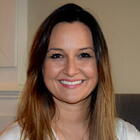Parenting in Times of War
Katie Maeve Murphy, Early Childhood Development Technical Advisor to the International Rescue Committee (IRC), joins host, Angelica Ponguta, Associate Research Scientist at Yale University. Mrs. Murphy discusses IRCs emphasis on family and parenting programs to foster early childhood development in crisis conditions to promote peacebuilding.
2022 UPDATE. For current information on the Ukraine and Afghanistan crisis and how you can help, please visit the IRC ► https://www.rescue.org/(link is external)

Parenting in Times of War
Guest, Katie Murphy, International Rescue Committee
2022 UPDATE. For current information on the Ukraine and Afghanistan crisis and how you can help, please visit the IRC ► https://www.rescue.org/
25 August 2015
Dr. Angelica Ponguta: My name is Angelica Ponguta and I am an Associate Research Scientist at the Yale Child Study Center. And with us today is Katie Maeve Murphy. Katie is an Early Childhood Technical Advisor at the International Rescue Committee or IRC. Katie has worked in over 20 countries around the world and has recently focused on early childhood development systems in crisis settings. Katie first started working with the IRC in 2005 as the Education Manger for Darfurian refugees in Northeastern Chad. And after spending several years working at The Earth Institute at Columbia University and returning to her studies at UPenn, she just recently returned to the IRC in January of this year. IRC is at work in over 40 countries and is one of the leading global agencies responding to the world’s worst humanitarian crises while helping people to survive and build their lives.
Thank you so much, Katie, for being with us today.
Katie Murphy: Thank you for having me.
Ponguta: Our first question will be to learn a little bit about the scope of IRC’s work on early childhood development in fragile settings.
Murphy: Sure, so the IRC has a long history of working to address the needs of children in disaster and conflict. It’s actually been around since 1933. And we know from research that young children are particularly susceptible to suffer the long-term negative effects of living in these crisis conditions. So with our child protection and education programs, we really focus on ensuring children are safe form violence, abuse, neglect, and exploitation. And this includes ensuring that they are receiving nurturing care from a consistent and healthy caregiver, that the families are receiving appropriate service and support, and that parents have sufficient income and resources to provide for their basic needs. We also have a strong focus on ensuring children have early learning opportunities both at home and informal educational settings. This is to promote cognitive, social, and emotional wellbeing.
So I guess to speak a little more specifically about the types of programs that we offer, we draw from a range of tools that can be adapted to fit the situation and needs of children in the context where we work. So just to highlight three key interventions: first of all parenting programs, which aim to reduce violence in the home and promote improved parent-child interaction. The second [is] early childhood education. We have a special program called “Healing Classrooms,” which has a specific emphasis on promoting psychosocial wellbeing of children and of teachers and of reducing the negative effects of exposure to crisis. And the third is case management programs, which are used to identify children’s individual needs and provide or refer children to appropriate services. And in many places where we work, where there have been conflict, disaster, displacement, this includes family tracing and reunification programs for children who have been separated from their caregivers.
And I won’t go into too much detail about the range of other programs, but we also work on initiatives focused on de-institutionalization of children, economic empowerment programs for families, gender-based violence prevention response, and social workforce strengthening initiatives. And it’s important to mention that ECD (early childhood development) does not just include social protection education, but also health, reproductive health, and nutrition programs. So we have a broad range of programs for young children to improve survival rates through child and maternal health programs, including community case management of child health, breastfeeding promotion, therapeutic feeding, and nutrition education programs for women and parents of young children.
Ponguta: Great. And, Katie, I would like to actually go back to your first area of intervention. Can you tell us why [the] focus on families versus other areas of social investment, particularly during times of war when there might be very other urgent needs as well?
Murphy: Sure, so we know that parents and caregivers serve a critical role in mitigating the negative effects of crisis and war. And it is through nurturing, responsive, and consistent care that parents are able to support children’s health and development and even strengthen their child’s ability to cope with adversity. Yet unfortunately, programs targeting young children often neglect to consider the wellbeing of parents and caregivers. We know that when adults experience trauma and adversity, there’s often a direct effect on their ability to provide nurture and care. And research also indicates that caregivers exposed to violence may be more likely to live in households with inter-familial violence and conflict [and] their children may be more likely to experience neglect or violent discipline. And all of these experiences can result in children exhibiting long-term emotional, behavioral, and cognitive disabilities.
So for these reasons we focus our expertise on implementing and advancing knowledge on family interventions. And we’ve developed models to foster healthy family relationships that aim to strengthen caregivers’ capacity to use positive discipline and appropriately respond to children’s needs. IRC’s parenting programs were first developed in 2009 and now have expanded across eight countries, which also includes workforce-strengthening initiatives in Tanzania designed to support a new cadre of trained social workers to facilitate parenting programs at scale.
Ponguta: Katie, I recently read a fantastic paper on some of the work you have been doing across the globe, particularly on a program called, “Families Make a Difference.” The article will be featured on our site, but I would like for you to also tell us a little bit more about the program itself and the realities it has faced during its implementation.
Murphy: Well, thank you. So building on insights generated through past decades of early childhood development and parenting research, the “Families Make A Difference” program is IRC’s parenting programing and it’s actually the model we use across the globe for caregivers of children 0 to 8 years of age. It’s also currently being used in the Syrian response region. The curriculum draws on evidence based parenting programs and is grounded in social learning theory using demonstrations, positive reinforcement, and coaching to develop and strengthen positive parenting practices.
So the program itself includes ten two hour sessions. It’s typically led by a pair of trained facilitators. And this is also complemented by home visiting and parenting support groups. Before starting each program, there’s a process of cultural adaptation and translation of the parenting modules to ensure that the content is relevant and appropriate for the context where we are working. The sessions are based on cognitive, developmental, and behavioral theory and encourage positive care giving practices aimed to strengthen caregivers’ resilience and psychosocial wellbeing. And this last part is particularly important in the Syrian context as IRC’s initial assessment of the protection needs that were conducted in the region identified adults experiencing really high levels of stress. And in focus group discussions, caregivers report that their heightened levels of stress was leading them to lose patience with their children, which was resulting in higher frequency of parenting practicing abusive and neglectful behavior towards their children.
So we’ve conducted rigorous evaluations of the parenting programs with partners from Duke University and from Harvard School of Public Health, hopefully one day, also Yale, and have demonstrated the IRC programs confer significant benefits on the lives of post-conflict children and families. So just for example, in the study that was conducted in Liberia with 270 families of children aged three to seven, caregivers report an average decrease of 56% of the use of harsh physical punishment and a 29% decrease in psychological punishment. The researchers also found significant increases in the quality of caregiver child interactions and the use of positive behavior management practices. And we are finding similar results from the preliminary analysis of the Syrian data, which we are still reviewing. But we found so far significant increases in use of positive coping strategies, decreases in the use of violent discipline, decreases in negative feelings, and improved resilience among caregivers.
Ponguta: Wow, this is really impressive. And actually let’s talk a little bit about the challenges when evaluating ECD programs in fragile contexts. Being a researching, [I] can really relate. But perhaps you can tell me from your perspective, what are some of the challenges you have faced again in the evaluation of ECD programs in fragile contexts and perhaps what are some of the ways in which these challenges can be overcome.
Murphy: So the first layer of challenges is really two-fold. First of all, conducting evaluations in fragile contexts comes with inherent challenges due to political instability, population dispersion and displacement, lack of access, and often lack of sufficient warning before an emergency occurs. So we often don’t have rigorous baseline data, which we can draw from. Secondly, evaluating ECD programs in developing countries also comes with a distinct set of challenges as there are typically no gold standard measures to assess children’s cognitive an social, emotional development, particularly measures that have been properly adapted and validated in the countries where we work.
And then on top of that, there’s sort of a second layer of challenges, which relates to the lack of funding to conduct rigorous evaluations and longer term studies. At the same time, I think on the silver lining, IRC has strong internal capacity in the areas of research, evaluation, and learning. We have existing partnerships with researchers and practitioners that are working to address these challenges. We’re also now in the process of developing a research agenda that includes implementation research to identify more effective ways of delivering programs in fragile contexts and looking into building partnerships with local and regional academics.
Ponguta: We really commend you for the work that you are advancing. And research, in particular, we know that it’s typically not the priority of practitioners and this evidence is very much need so it’s great to hear IRC leading the work in this arena. To end, a couple of more questions, the first one would be a little more global, kind of stepping away from IRC’s programming per se. As you know, the them of our work is the link between early childhood peace-building, violence prevention, and social transformation. So can you tell us a little bit about what you think these links are, again between the constructs of ECD, peacebuilding, violence prevention, and social transformation?
Murphy: Sure. So it’s estimated that over 230 million children are currently living in countries affected by armed conflict, which we know is a tragedy that needs to be addressed. The science of early childhood development clearly points to the negative repercussions of these experiences of trauma, not just for the individual child, but also for society as a whole. If, as a global community, we are serious about our dedication to building peace and ending the intergenerational transmission of violence and poverty, we have to begin with initiatives that prevent and reduce the negative effects of trauma and improve early childhood development outcomes.
So by increasing support and attention to the issues of parenting in context of war, I think that researchers, practitioners, donors, policymakers, communities, caregivers, and children can all work together to change the developmental trajectory of millions of children at risk for poor outcomes and improve the future health and wellbeing of these war-torn communities.
Ponguta: Great, and I think this sort of ties into our next question, which is again one of the other major goals that we currently have. It’s to really shift the paradigm of peace-building to really investing in social areas, particularly around families and children. And so perhaps from you perspective, you can tell us a little bit about how do you think local governments and local partners could be able to mobilize resources for families and young children in particularly fragile contexts.
Murphy: Sure, so partnerships are critical to success of programs focused on families and young children. And some of this work focuses on advocating for improved policies and programs, which also include family-based approaches to ECD. Now we have a broad body of research indicating that investing in young children yields high rates of returns and we could use the evidence to advocate for financing for improved programs and to mobilize allocations from local and central governments to implement parenting programs. Local governments and local partners are often key sources of contextual knowledge and also can provide insights into cultural adaptation process. So often, the local partners have experienced staff members on the ground that understand the local language, social norms, customs, and parenting practice. And this can really be essential for designing effective strategies. And working through partnerships and local staff can also ensure the sustainability of programs so that even after IRC has left a particular place, the knowledge and local support for the program continue.
Ponguta: Fantastic. Katie, thank you so much for this terrific contribution and best of luck to you and to IRC in the monumentally important work that you are doing for families and children across the world.
Murphy: Thank you so much, it was a pleasure to speak with you.
JOIN THE CONVERSATION
For breaking news and to stay connected, follow us on social media. Sign up to get our E-News delivered straight to your inbox.



